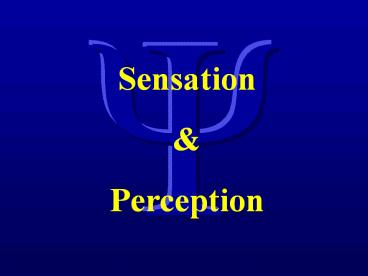PowerPointPrsentation
1 / 16
Title: PowerPointPrsentation
1
?
Sensation Perception
2
?
-Discussion Section- Session 2
Methods Psychophysical Methods Electrophysiologic
al Methods
3
Presentation 1 Human orientation
discrimination tested with long stimuli
(1984)presented by Michelle Arroyo
Presentation 2 Oblique effect A neural basis
in the vsiual cortex (2003)presented by Hillary
Schiff
4
BACKGROUND
5
The concept of the receptive field
A receptive field is that part of the visual
field that a neuron responds to by changing its
firing rate if a stimulus is in it.
Its part of the external world but a property of
a neuron.
6
Model
- Overlap
- Convergence
- Eccentricity
RF
World
PR in retina
Neuronal layer 1
Neuronal layer 2
7
The receptive field map
- Size scales with
- Eccentricity
- Cortical hierarchy
1 degree of visual angle roughly 1.5 the area
of the thumbnail at arms length
http//redwood.ucdavis.edu/bruno/psc129/handouts/u
seful-numbers/useful-numbers.html
8
Both papers today deal with V1
- V1 in the monkey Area 17 in Cats/People
- Striate cortex (Cytoarchitectonically)
- Primary visual cortex (Functionally)
- RF sizes small. Generally smaller than 1 degree.
Foveally smaller than ¼ degree. - Tuned (Differentially Sensitive) for 6 qualities
in the receptive field, including Spatial
Frequency and Orientation.
9
Spatial Frequency
in cycles per degree of visual angle
High Contrast Low
Low Spatial Frequency High
10
Orientation
0, 180
45, 225
90, 270
135, 315
11
(Orientation) Tuning curves
Firing rate in Hz
Orientation in degrees
Tuning width in degrees
Watkins Berkley (1974)
12
Length summation in V1 RF
13
Perception and Memory
- Introducing memory
- Out of the pan into the fire
- On the next slide, memorize one of the cards but
keep it a secret.
14
(No Transcript)
15
(No Transcript)
16
Now for the real thing































